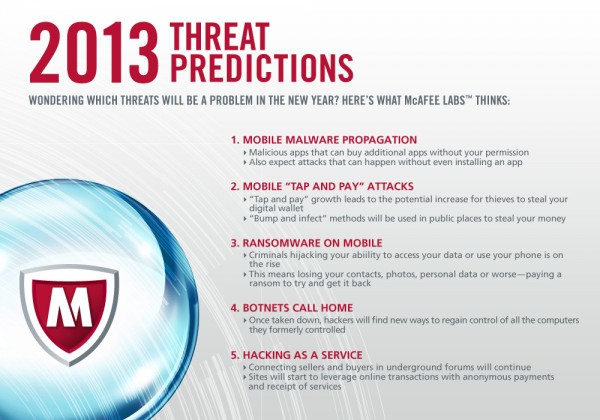The threat of mobile malware and large-scale attacks to take down infrastructure may become reality in 2013, according to a report released yesterday by McAfee.
The security company says it is likely that a new Trojan horse mobile worm will trick users into buying and installing malicious apps without user permission. Another danger: unknowingly downloading a malware that cuts off communication with mobile service providers, blocking security updates that help to remove malware.
Such apps would allow the malware to remain for a long time, warned McAfee, who based its predictions on data collected on malware in 2012.
Mobile worms with NFC (near-field communications) capabilities will also be on the rise, targeting mobile phones with NFC-enabled “digital wallets” to steal user data. Worse, these NFC-enabled mobile worms would be able to spread from device to device, especially in crowded areas where NFC devices and users are in close proximity.
McAfee also predicts that in 2013, “ransomware” will increase. Ransomware freezes a user’s phone or tablet, preventing users from accessing their data until a ransom is ponied up.
Other significant findings from the McAfee 2013 Threat Predictions report include big-scale attacks by hackers that cause widespread damage. These attacks will put vulnerable companies and businesses at risk if destructive malware is installed on their networks.
Attacks on Windows 8 and HTML5 would be a prominent trend in 2013 as well. With over 70 per cent of users around the world using browsers that support HTML5, chances are that hackers would target and try to uncover loopholes in HTML5 security, according to McAfee.
In addition, with Windows 8 being a more secure operating system than previous versions, hackers will likely create smarter malware to target Windows 8. McAfee advises Windows 8 users to watch out for phishing scams, in particular.
More on the McAfee 2013 Threat Predictions report can be found here.






